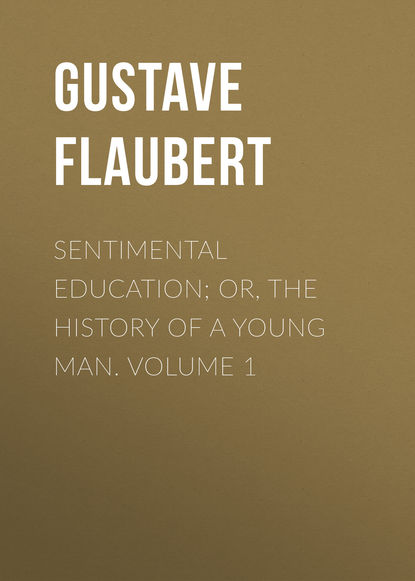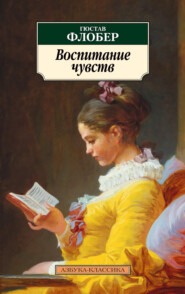По всем вопросам обращайтесь на: info@litportal.ru
(©) 2003-2024.
✖
Sentimental Education; Or, The History of a Young Man. Volume 1
Настройки чтения
Размер шрифта
Высота строк
Поля
"Have we not enough of insults from the foreigner?"
Except at these critical periods he remained taciturn, contemplating "an infallible stroke of business that would burst up the whole shop."
Whilst he was lost in these reflections, Arnoux in a monotonous voice and with a slight look of intoxication, related incredible anecdotes in which he always shone himself, owing to his assurance; and Frederick (this was, no doubt, due to some deep-rooted resemblances) felt more or less attracted towards him. He reproached himself for this weakness, believing that on the contrary he ought to hate this man.
Arnoux, in Frederick's presence, complained of his wife's ill-temper, her obstinacy, her unjust accusations. She had not been like this in former days.
"If I were you," said Frederick, "I would make her an allowance and live alone."
Arnoux made no reply; and the next moment he began to sound her praises. She was good, devoted, intelligent, and virtuous; and, passing to her personal beauty, he made some revelations on the subject with the thoughtlessness of people who display their treasures at taverns.
His equilibrium was disturbed by a catastrophe.
He had been appointed one of the Board of Superintendence in a kaolin company. But placing reliance on everything that he was told, he had signed inaccurate reports and approved, without verification, of the annual inventories fraudulently prepared by the manager. The company had now failed, and Arnoux, being legally responsible, was, along with the others who were liable under the guaranty, condemned to pay damages, which meant a loss to him of thirty thousand francs, not to speak of the costs of the judgment.
Frederick read the report of the case in a newspaper, and at once hurried off to the Rue de Paradis.
He was ushered into Madame's apartment. It was breakfast-time. A round table close to the fire was covered with bowls of café au lait. Slippers trailed over the carpet, and clothes over the armchairs. Arnoux was attired in trousers and a knitted vest, with his eyes bloodshot and his hair in disorder. Little Eugène was crying at the pain caused by an attack of mumps, while nibbling at a slice of bread and butter. His sister was eating quietly. Madame Arnoux, a little paler than usual, was attending on all three of them.
"Well," said Arnoux, heaving a deep sigh, "you know all about it?"
And, as Frederick gave him a pitying look: "There, you see, I have been the victim of my own trustfulness!"
Then he relapsed into silence, and so great was his prostration, that he pushed his breakfast away from him. Madame Arnoux raised her eyes with a shrug of the shoulders. He passed his hand across his forehead.
"After all, I am not guilty. I have nothing to reproach myself with. 'Tis a misfortune. It will be got over – ay, and so much the worse, faith!"
He took a bite of a cake, however, in obedience to his wife's entreaties.
That evening, he wished that she should go and dine with him alone in a private room at the Maison d'Or. Madame Arnoux did not at all understand this emotional impulse, taking offence, in fact, at being treated as if she were a light woman. Arnoux, on the contrary, meant it as a proof of affection. Then, as he was beginning to feel dull, he went to pay the Maréchale a visit in order to amuse himself.
Up to the present, he had been pardoned for many things owing to his reputation for good-fellowship. His lawsuit placed him amongst men of bad character. No one visited his house.
Frederick, however, considered that he was bound in honour to go there more frequently than ever. He hired a box at the Italian opera, and brought them there with him every week. Meanwhile, the pair had reached that period in unsuitable unions when an invincible lassitude springs from concessions which people get into the habit of making, and which render existence intolerable. Madame Arnoux restrained her pent-up feelings from breaking out; Arnoux became gloomy; and Frederick grew sad at witnessing the unhappiness of these two ill-fated beings.
She had imposed on him the obligation, since she had given him her confidence, of making enquiries as to the state of her husband's affairs. But shame prevented him from doing so. It was painful to him to reflect that he coveted the wife of this man, at whose dinner-table he constantly sat. Nevertheless, he continued his visits, excusing himself on the ground that he was bound to protect her, and that an occasion might present itself for being of service to her.
Eight days after the ball, he had paid a visit to M. Dambreuse. The financier had offered him twenty shares in a coal-mining speculation; Frederick did not go back there again. Deslauriers had written letters to him, which he left unanswered. Pellerin had invited him to go and see the portrait; he always put it off. He gave way, however, to Cisy's persistent appeals to be introduced to Rosanette.
She received him very nicely, but without springing on his neck as she used to do formerly. His comrade was delighted at being received by a woman of easy virtue, and above all at having a chat with an actor. Delmar was there when he called. A drama in which he appeared as a peasant lecturing Louis XIV. and prophesying the events of '89 had made him so conspicuous, that the same part was continually assigned to him; and now his function consisted of attacks on the monarchs of all nations. As an English brewer, he inveighed against Charles I.; as a student at Salamanca, he cursed Philip II.; or, as a sensitive father, he expressed indignation against the Pompadour – this was the most beautiful bit of acting! The brats of the street used to wait at the door leading to the side-scenes in order to see him; and his biography, sold between the acts, described him as taking care of his aged mother, reading the Bible, assisting the poor, in fact, under the aspect of a Saint Vincent de Paul together with a dash of Brutus and Mirabeau. People spoke of him as "Our Delmar." He had a mission; he became another Christ.
All this had fascinated Rosanette; and she had got rid of Père Oudry, without caring one jot about consequences, as she was not of a covetous disposition.
Arnoux, who knew her, had taken advantage of the state of affairs for some time past to spend very little money on her. M. Roque had appeared on the scene, and all three of them carefully avoided anything like a candid explanation. Then, fancying that she had got rid of the other solely on his account, Arnoux increased her allowance, for she was living at a very expensive rate. She had even sold her cashmere in her anxiety to pay off her old debts, as she said; and he was continually giving her money, while she bewitched him and imposed upon him pitilessly. Therefore, bills and stamped paper rained all over the house. Frederick felt that a crisis was approaching.
One day he called to see Madame Arnoux. She had gone out. Monsieur was at work below stairs in the shop. In fact, Arnoux, in the midst of his Japanese vases, was trying to take in a newly-married pair who happened to be well-to-do people from the provinces. He talked about wheel-moulding and fine-moulding, about spotted porcelain and glazed porcelain; the others, not wishing to appear utterly ignorant of the subject, listened with nods of approbation, and made purchases.
When the customers had gone out, he told Frederick that he had that very morning been engaged in a little altercation with his wife. In order to obviate any remarks about expense, he had declared that the Maréchale was no longer his mistress. "I even told her that she was yours."
Frederick was annoyed at this; but to utter reproaches might only betray him. He faltered: "Ah! you were in the wrong – greatly in the wrong!"
"What does that signify?" said Arnoux. "Where is the disgrace of passing for her lover? I am really so myself. Would you not be flattered at being in that position?"
Had she spoken? Was this a hint? Frederick hastened to reply:
"No! not at all! on the contrary!"
"Well, what then?"
"Yes, 'tis true; it makes no difference so far as that's concerned."
Arnoux next asked: "And why don't you call there oftener?"
Frederick promised that he would make it his business to go there again.
"Ah! I forgot! you ought, when talking about Rosanette, to let out in some way to my wife that you are her lover. I can't suggest how you can best do it, but you'll find out that. I ask this of you as a special favour – eh?"
The young man's only answer was an equivocal grimace. This calumny had undone him. He even called on her that evening, and swore that Arnoux's accusation was false.
"Is that really so?"
He appeared to be speaking sincerely, and, when she had taken a long breath of relief, she said to him:
"I believe you," with a beautiful smile. Then she hung down her head, and, without looking at him:
"Besides, nobody has any claim on you!"
So then she had divined nothing; and she despised him, seeing that she did not think he could love her well enough to remain faithful to her! Frederick, forgetting his overtures while with the other, looked on the permission accorded to him as an insult to himself.
After this she suggested that he ought now and then to pay Rosanette a visit, to get a little glimpse of what she was like.
Arnoux presently made his appearance, and, five minutes later, wished to carry him off to Rosanette's abode.
The situation was becoming intolerable.
His attention was diverted by a letter from a notary, who was going to send him fifteen thousand francs the following day; and, in order to make up for his neglect of Deslauriers, he went forthwith to tell him this good news.
The advocate was lodging in the Rue des Trois-Maries, on the fifth floor, over a courtyard. His study, a little tiled apartment, chilly, and with a grey paper on the walls, had as its principal decoration a gold medal, the prize awarded him on the occasion of taking out his degree as a Doctor of Laws, which was fixed in an ebony frame near the mirror. A mahogany bookcase enclosed under its glass front a hundred volumes, more or less. The writing-desk, covered with sheep-leather, occupied the centre of the apartment. Four old armchairs upholstered in green velvet were placed in the corners; and a heap of shavings made a blaze in the fireplace, where there was always a bundle of sticks ready to be lighted as soon as he rang the bell. It was his consultation-hour, and the advocate had on a white cravat.
The announcement as to the fifteen thousand francs (he had, no doubt, given up all hope of getting the amount) made him chuckle with delight.
"That's right, old fellow, that's right – that's quite right!"
He threw some wood into the fire, sat down again, and immediately began talking about the journal. The first thing to do was to get rid of Hussonnet.
"I'm quite tired of that idiot! As for officially professing opinions, my own notion is that the most equitable and forcible position is to have no opinions at all."
Frederick appeared astonished.
Except at these critical periods he remained taciturn, contemplating "an infallible stroke of business that would burst up the whole shop."
Whilst he was lost in these reflections, Arnoux in a monotonous voice and with a slight look of intoxication, related incredible anecdotes in which he always shone himself, owing to his assurance; and Frederick (this was, no doubt, due to some deep-rooted resemblances) felt more or less attracted towards him. He reproached himself for this weakness, believing that on the contrary he ought to hate this man.
Arnoux, in Frederick's presence, complained of his wife's ill-temper, her obstinacy, her unjust accusations. She had not been like this in former days.
"If I were you," said Frederick, "I would make her an allowance and live alone."
Arnoux made no reply; and the next moment he began to sound her praises. She was good, devoted, intelligent, and virtuous; and, passing to her personal beauty, he made some revelations on the subject with the thoughtlessness of people who display their treasures at taverns.
His equilibrium was disturbed by a catastrophe.
He had been appointed one of the Board of Superintendence in a kaolin company. But placing reliance on everything that he was told, he had signed inaccurate reports and approved, without verification, of the annual inventories fraudulently prepared by the manager. The company had now failed, and Arnoux, being legally responsible, was, along with the others who were liable under the guaranty, condemned to pay damages, which meant a loss to him of thirty thousand francs, not to speak of the costs of the judgment.
Frederick read the report of the case in a newspaper, and at once hurried off to the Rue de Paradis.
He was ushered into Madame's apartment. It was breakfast-time. A round table close to the fire was covered with bowls of café au lait. Slippers trailed over the carpet, and clothes over the armchairs. Arnoux was attired in trousers and a knitted vest, with his eyes bloodshot and his hair in disorder. Little Eugène was crying at the pain caused by an attack of mumps, while nibbling at a slice of bread and butter. His sister was eating quietly. Madame Arnoux, a little paler than usual, was attending on all three of them.
"Well," said Arnoux, heaving a deep sigh, "you know all about it?"
And, as Frederick gave him a pitying look: "There, you see, I have been the victim of my own trustfulness!"
Then he relapsed into silence, and so great was his prostration, that he pushed his breakfast away from him. Madame Arnoux raised her eyes with a shrug of the shoulders. He passed his hand across his forehead.
"After all, I am not guilty. I have nothing to reproach myself with. 'Tis a misfortune. It will be got over – ay, and so much the worse, faith!"
He took a bite of a cake, however, in obedience to his wife's entreaties.
That evening, he wished that she should go and dine with him alone in a private room at the Maison d'Or. Madame Arnoux did not at all understand this emotional impulse, taking offence, in fact, at being treated as if she were a light woman. Arnoux, on the contrary, meant it as a proof of affection. Then, as he was beginning to feel dull, he went to pay the Maréchale a visit in order to amuse himself.
Up to the present, he had been pardoned for many things owing to his reputation for good-fellowship. His lawsuit placed him amongst men of bad character. No one visited his house.
Frederick, however, considered that he was bound in honour to go there more frequently than ever. He hired a box at the Italian opera, and brought them there with him every week. Meanwhile, the pair had reached that period in unsuitable unions when an invincible lassitude springs from concessions which people get into the habit of making, and which render existence intolerable. Madame Arnoux restrained her pent-up feelings from breaking out; Arnoux became gloomy; and Frederick grew sad at witnessing the unhappiness of these two ill-fated beings.
She had imposed on him the obligation, since she had given him her confidence, of making enquiries as to the state of her husband's affairs. But shame prevented him from doing so. It was painful to him to reflect that he coveted the wife of this man, at whose dinner-table he constantly sat. Nevertheless, he continued his visits, excusing himself on the ground that he was bound to protect her, and that an occasion might present itself for being of service to her.
Eight days after the ball, he had paid a visit to M. Dambreuse. The financier had offered him twenty shares in a coal-mining speculation; Frederick did not go back there again. Deslauriers had written letters to him, which he left unanswered. Pellerin had invited him to go and see the portrait; he always put it off. He gave way, however, to Cisy's persistent appeals to be introduced to Rosanette.
She received him very nicely, but without springing on his neck as she used to do formerly. His comrade was delighted at being received by a woman of easy virtue, and above all at having a chat with an actor. Delmar was there when he called. A drama in which he appeared as a peasant lecturing Louis XIV. and prophesying the events of '89 had made him so conspicuous, that the same part was continually assigned to him; and now his function consisted of attacks on the monarchs of all nations. As an English brewer, he inveighed against Charles I.; as a student at Salamanca, he cursed Philip II.; or, as a sensitive father, he expressed indignation against the Pompadour – this was the most beautiful bit of acting! The brats of the street used to wait at the door leading to the side-scenes in order to see him; and his biography, sold between the acts, described him as taking care of his aged mother, reading the Bible, assisting the poor, in fact, under the aspect of a Saint Vincent de Paul together with a dash of Brutus and Mirabeau. People spoke of him as "Our Delmar." He had a mission; he became another Christ.
All this had fascinated Rosanette; and she had got rid of Père Oudry, without caring one jot about consequences, as she was not of a covetous disposition.
Arnoux, who knew her, had taken advantage of the state of affairs for some time past to spend very little money on her. M. Roque had appeared on the scene, and all three of them carefully avoided anything like a candid explanation. Then, fancying that she had got rid of the other solely on his account, Arnoux increased her allowance, for she was living at a very expensive rate. She had even sold her cashmere in her anxiety to pay off her old debts, as she said; and he was continually giving her money, while she bewitched him and imposed upon him pitilessly. Therefore, bills and stamped paper rained all over the house. Frederick felt that a crisis was approaching.
One day he called to see Madame Arnoux. She had gone out. Monsieur was at work below stairs in the shop. In fact, Arnoux, in the midst of his Japanese vases, was trying to take in a newly-married pair who happened to be well-to-do people from the provinces. He talked about wheel-moulding and fine-moulding, about spotted porcelain and glazed porcelain; the others, not wishing to appear utterly ignorant of the subject, listened with nods of approbation, and made purchases.
When the customers had gone out, he told Frederick that he had that very morning been engaged in a little altercation with his wife. In order to obviate any remarks about expense, he had declared that the Maréchale was no longer his mistress. "I even told her that she was yours."
Frederick was annoyed at this; but to utter reproaches might only betray him. He faltered: "Ah! you were in the wrong – greatly in the wrong!"
"What does that signify?" said Arnoux. "Where is the disgrace of passing for her lover? I am really so myself. Would you not be flattered at being in that position?"
Had she spoken? Was this a hint? Frederick hastened to reply:
"No! not at all! on the contrary!"
"Well, what then?"
"Yes, 'tis true; it makes no difference so far as that's concerned."
Arnoux next asked: "And why don't you call there oftener?"
Frederick promised that he would make it his business to go there again.
"Ah! I forgot! you ought, when talking about Rosanette, to let out in some way to my wife that you are her lover. I can't suggest how you can best do it, but you'll find out that. I ask this of you as a special favour – eh?"
The young man's only answer was an equivocal grimace. This calumny had undone him. He even called on her that evening, and swore that Arnoux's accusation was false.
"Is that really so?"
He appeared to be speaking sincerely, and, when she had taken a long breath of relief, she said to him:
"I believe you," with a beautiful smile. Then she hung down her head, and, without looking at him:
"Besides, nobody has any claim on you!"
So then she had divined nothing; and she despised him, seeing that she did not think he could love her well enough to remain faithful to her! Frederick, forgetting his overtures while with the other, looked on the permission accorded to him as an insult to himself.
After this she suggested that he ought now and then to pay Rosanette a visit, to get a little glimpse of what she was like.
Arnoux presently made his appearance, and, five minutes later, wished to carry him off to Rosanette's abode.
The situation was becoming intolerable.
His attention was diverted by a letter from a notary, who was going to send him fifteen thousand francs the following day; and, in order to make up for his neglect of Deslauriers, he went forthwith to tell him this good news.
The advocate was lodging in the Rue des Trois-Maries, on the fifth floor, over a courtyard. His study, a little tiled apartment, chilly, and with a grey paper on the walls, had as its principal decoration a gold medal, the prize awarded him on the occasion of taking out his degree as a Doctor of Laws, which was fixed in an ebony frame near the mirror. A mahogany bookcase enclosed under its glass front a hundred volumes, more or less. The writing-desk, covered with sheep-leather, occupied the centre of the apartment. Four old armchairs upholstered in green velvet were placed in the corners; and a heap of shavings made a blaze in the fireplace, where there was always a bundle of sticks ready to be lighted as soon as he rang the bell. It was his consultation-hour, and the advocate had on a white cravat.
The announcement as to the fifteen thousand francs (he had, no doubt, given up all hope of getting the amount) made him chuckle with delight.
"That's right, old fellow, that's right – that's quite right!"
He threw some wood into the fire, sat down again, and immediately began talking about the journal. The first thing to do was to get rid of Hussonnet.
"I'm quite tired of that idiot! As for officially professing opinions, my own notion is that the most equitable and forcible position is to have no opinions at all."
Frederick appeared astonished.

















